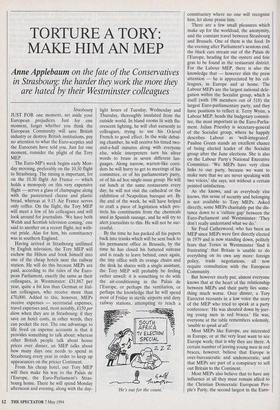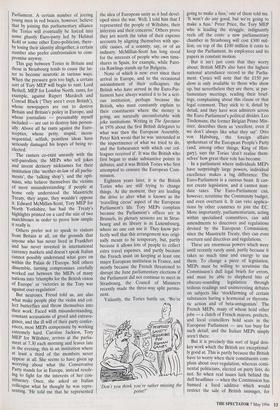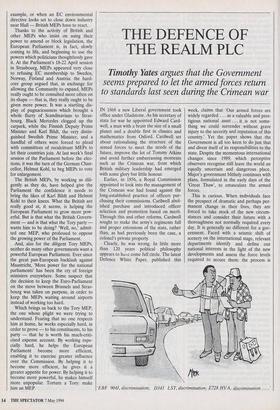TORTURE A TORY: MAKE HIM AN MEP
Anne Applebaum on the fate of the Conservatives in Strasbourg.• the harder they work the more they are hated by their Westminster colleagues Strasbourg JUST FOR one moment, set aside your European prejudices. Just for one moment, forget whether you think the European Community will save British industry or destroy British institutions, pay no attention to what the Euro-sceptics and the Eurocrats have told you. Just for one moment, consider the plight of the Tory MEP.
The Euro-MP's week begins early Mon- day morning, preferably on the 10.30 flight to Strasbourg. The timing is important, for on the 10.30 flight Air France — which holds a monopoly on this very expensive flight — serves a glass of champagne along with the pasteurised cheese and plastic bread, whereas at 9.15 Air France serves only coffee. On the flight, the Tory MEP will meet a few of his colleagues and will look around for journalists. 'We have both Welsh and Scottish television coming,' one said to another on a recent flight, not with- out pride. Alas for him, his constituency was in southern England.
Having arrived in Strasbourg unfilmed by English television, the Tory MEP will eschew the Hilton and book himself into one of the cheap hotels near the railway station. He will do this because MEPs are paid, according to the rules of the Euro- pean Parliament, exactly the same as their colleagues, in Westminster: £31,867 per year, quite a bit less than German or Ital- ian colleagues, who receive more than £70,000. Added to this, however, MEPs receive expenses — secretarial expenses, travel expenses and, most notably, £150 per diem when they are in Strasbourg: if they save on hotel costs, in other words, they can pocket the rest. The one advantage to life lived on expense accounts is that it provides something to talk about: whereas other British people talk about house prices over dinner, an MEP talks about how many days one needs to spend in Strasbourg every year in order to keep up appearances on the pricier Continent.
From his cheap hotel, our Tory MEP will then make his way to the Palais de l'Europe, the Euro-Parliament's Stras- bourg home. There he will spend Monday afternoon and evening, along with the day- light hours of Tuesday, Wednesday and Thursday, thoroughly insulated from the outside world. In bland rooms lit with flu- orescent lighting, he will chat earnestly to colleagues, trying to use his 0-level French to good effect. In the wide debat- ing chamber, he will receive his timed two- and-a-half minutes along with everyone else, while interpreters turn his silver words to brass in seven different lan- guages. Along narrow, warren-like corri- dors he will hurry to get to meetings of his committee, or of his parliamentary party, or of his ad hoc single-issue group. He will eat lunch at the same restaurants every day; he will not visit the cathedral or the exhibition of Neapolitan baroque art. By the end of the week, he will 'have helped to craft a piece of legislation which pro- tects his constituents from the chemicals used in Spanish sausage, and he will try to alert journalists to this. He will not be suc- cessful.
By the time he has packed all his papers back into trunks which will be sent back to his permanent office in Brussels, by the time he has closed his battered suitcase and is ready to leave behind, once again, the tiny office with its orange chairs and the desk he shares with a single assistant, the Tory MEP will probably be feeling rather unwell: it is something to do with the air-conditioning in the Palais de l'Europe, or perhaps the ventilation, or perhaps the knowledge that he will spend most of Friday in sterile airports and dirty railway stations, attempting to reach a `He's out for the count.' constituency where no one will recognise him, let alone praise him.
There are a few small pleasures which make up for the workload, the anonymity, and the constant travel between Strasbourg and Brussels. One of them is the food. In the evening after Parliament's sessions end, the black cars stream out of the Palais de l'Europe, heading for the oysters and foie gras to be found in the restaurant district. For the Labour MEP, there is also the knowledge that — however slim the press attention — he is appreciated by his col- leagues, in Europe and at home. The Labour MEPs are the largest national dele- gation within the Socialist group, which is itself (with 198 members out of 518) the largest Euro-parliamentary party, and they have positions to reflect it. Terry Wynn, a Labour MEP, heads the budgetary commit- tee, the most important in the Euro-Parlia- ment. Julian Priestley is secretary-general of the Socialist group, where he happily describes Labour as 'well-integrated'. Pauline Green stands an excellent chance of being elected leader of the Socialist group after the June elections. She is also on the Labour Party's National Executive Committee. 'We MEPs have very close links to our party, because we want to make sure that we are never speaking with two voices,' she says, not without a certain pointed satisfaction.
As she knows, and as everybody else knows, this sense of security and belonging is not available to Tory MEPs. Asked directly, some MEPs charitably put the dis- tance down to a 'culture gap' between the Euro-Parliament and Westminster: 'They don't really understand what we do.'
Sir Fred Catherwood, who has been an MEP since MEPs were first directly elected in 1979 and is now standing down, politely fears that Tories in Westminster 'find it frustrating' that Britain is unable to do everything on its own any more: foreign policy, trade negotiations, all now require consultation with the European Community.
But however nicely put, almost everyone knows that at the heart of the relationship between MEPs and their party lies some- thing much worse. Over dinner, a Tory Eurocrat recounts in a low voice the story of the MEP who tried to speak at a party conference: 'He was shouted down by jeer- ing young men in red braces.' He was, everyone at the table remembers solemnly, `unable to speak at all'.
Most MEPs like Europe, are interested in Europe, or at the very least want to see Europe work; that is why they are there. A certain number of jeering young men in red braces, however, believe that Europe is over-bureaucratic and undemocratic, and that MEPs are part of a conspiracy to sell out Britain to the Continent.
Most MEPs also believe that to have any influence at all they must remain allied to the Christian Democratic European Peo- ple's Party, the second largest in the Euro- Parliament. A certain number of jeering young men in red braces, however, believe that by joining this parliamentary alliance the Tories will eventually be forced into some ghastly Euro-party led by Helmut Kohl or some other Euro-politician, there- by losing their identity altogether; a certain number also prefer confrontation to com- promise anyway.
This gap between Tories in Britain and those in Strasbourg tends to cause the lat- ter to become neurotic in various ways. When the pressure gets too high, a certain sort of Tory MEP will begin to rant. Lord Bethell, MEP for London North, rants, for example, against Rupert Murdoch and Conrad Black (`They aren't even British'), whose newspapers are out to destroy Britain and Britain's policy in Europe, and whose journalists — presumably myself included — are out to destroy him person- ally. Above all he rants against the Euro- sceptics, whose petty, stupid, incon- sequential, selfish, pointless ideas have seriously damaged his hopes of being re- elected.
The ranters co-exist uneasily with the self-parodists, the MEPs who tell jokes and invent derisory nicknames for their institution (the 'mother-in-law of all parlia- ments', the 'talking shop'), and the opti- mists, who believe themselves the victims of mere misunderstanding: if people at home only understood the Maastricht Treaty, they argue, they wouldn't oppose it. Edward McMillan-Scott, Tory MEP for North Yorkshire, has had the Treaty's highlights printed on a card the size of two matchboxes in order to prove how simple it really is.
Others prefer not to speak to visitors from Britain at all, on the grounds that anyone who has never lived in Frankfurt and has never invested in international currency markets and doesn't speak Italian cannot possibly understand what goes on within the Palais de l'Europe. Still others dissemble, turning compromises carefully worked out between the MEPs of many nations into 'triumphs for the British vision of Europe' or 'victories in the Tory war against over-regulation'.
But neuroses, Freud told us, are also what make people play the violin and col- lect butterflies and throw themselves into their work. Faced with misunderstanding, constant accusations of greed and extrava- gance, and the ill will of their party confer- ences, most MEPs compensate by working extremely hard. Caroline Jackson, Tory MEP for Wiltshire, arrives at the parlia- ment at 7.30 each morning and leaves late in the evening; this in an institution where at least a third of the members never appear at all. She seems to have given up worrying about what the Conservative Party stands for in Europe, instead resolv- ing to fight for the interests of her con- stituency. Once, she asked an Italian colleague what he thought he was repre- senting. 'He told me that he represented the idea of European unity as it had devel- oped since the war. Well, I told him that I represented the people of Wiltshire, their interests and their concerns.' Others prove they are worth the value of their expense accounts by aligning themselves with spe- cific causes, of a country, say, or of an industry. McMillan-Scott has long stood for the interests of people who own time- shares in Spain, for example, while Patri- cia Rawlings stands up for Bulgaria.
None of which is new: ever since their arrival in Europe, and to the occasional astonishment of their colleagues, the British who have served in the Euro-Par- liament have always wanted it to be a seri- ous institution, perhaps because the British, who must constantly explain to their constituents where the money is going, are naturally uncomfortable with joke institutions. Writing in The Spectator in 1976 about the first British delegates to what was then the European Assembly, Peter Kirk wrote that he was 'astounded at the impertinence of what we tried to do, and the forbearance with which our col- leagues received it'. It was the British who first began to make substantive points in debates, and it was British Tories who first attempted to censure the European Com- mission.
Eighteen years later, it is the British Tories who are still trying to change things. At the moment, they are leading the drive to alter what is known as the `travelling circus' aspect of the European Parliament's life. Tory MEPs complain because the Parliament's offices are in Brussels, its plenary sessions are in Stras- bourg and its library is in Luxembourg, where no one can use it. They know per- fectly well that this arrangement was origi- nally meant to be temporary, but, partly because it allows lots of people to collect extra travel expenses, and partly because the French insist on keeping at least one major European institution in France, and mostly because the French threatened to disrupt the June parliamentary elections if the Parliament did not continue to meet in Strasbourg, the Council of Ministers recently made the three-way split perma- nent.
Valiantly, the Tories battle on. 'We're 'Don't you think you're rather missing the point?' going to make a fuss,' one of them told me. `It won't do any good, but we're going to make a fuss.' Peter Price, the Tory MEP who is leading the struggle, indignantly reels off the costs: a new parliamentary chamber in Strasbourg will cost £300 mil- lion, on top of the £100 million it costs to keep the Parliament, its employees and its papers in constant motion.
But it isn't just costs that they worry about; British MEPs also have the highest national attendance record in the Parlia- ment. Cynics will note that the £150 per diem is only available to those who show up, but nevertheless they are there, at par- liamentary meetings, reading their brief- ings, complaining about this clause or that legal comment. They stick to it, detail by detail, and they have won admirers across the Euro-Parliament's political divides. Leo Tindemans, the former Belgian Prime Min- ister, describes them as 'excellent, even if we don't always like what they say'. Otto von Habsburg, the foreign affairs spokesman of the European People's Party (and, among other things, King of Hun- gary), says the Tories 'don't realise them- selves' how great their role has become.
In a parliament where individuals MEPs have surprisingly large powers, individual excellence makes a big difference. The Euro-Parliament is a curious beast. It can- not create legislation, and it cannot man- date taxes. The Euro-Parliament can, however, scrutinise the Community budget, and even overturn it. It can veto applica- tions by other countries to join the EC. More importantly, parliamentarians, acting within specialised committees, can add amendments to directives and regulations devised by the European Commission; since the Maastricht Treaty, they can even overturn said directives and regulations.
These are enormous powers which were until recently rarely used, partly because it takes so much time and energy to use them. To change a piece of legislation, MEPs must be willing to scrutinise the Commission's dull legal briefs for errors, and must be able to shepherd bits of obscure-sounding legislation through tedious readings and uninteresting debates on subjects like `stockfarming of certain substances having a hormonal or thyrosta- tic action and of beta-antagonists'. The French MEPs, many of whom hold other jobs — a clutch of French mayors, prefects, and local councillors hold seats in the European Parliament — are too busy for such detail, and the Italian MEPs simply aren't there.
But it is precisely this sort of legal don- key work which the British are exceptional- ly good at. This is partly because the British have to worry when their constituents com- plain about over-regulation, whereas conti- nental politicians, elected on party lists, do not. So when real issues lurk behind the dull headlines — when the Commission has banned a food additive which would restrict the sale of British sausages, for example, or when an EC environmental directive looks set to close down industry near Hull — British MEPs have to react.
Thanks to the activity of British and other MEPs who insist on using their power to amend or block legislation, the European Parliament is, in fact, slowly coming to life, and beginning to use the powers which politicians thoughtlessly gave it. At the Parliament's 18-22 April session in Strasbourg, MEPs appeared very close to refusing EC membership to Sweden, Norway, Finland and Austria: the hard- core group argued that, in exchange for allowing the Community to expand, MEPs really ought to be consulted more often on its shape — that is, they really ought to be given more power. It was a startling dis- play of pugnaciousness which brought a whole flurry of Scandinavians to Stras- bourg. Black Mercedes clogged up the carpark, while the Finnish Deputy Prime Minister and Karl Bildt, the very distin- guished Swedish Prime Minister, and a handful of others were forced to plead with committees of recalcitrant MEPs to let their countries join. At last week's final session of the Parliament before the elec- tions, it was the turn of the German Chan- cellor, Helmut Kohl, to beg MEPs to vote for enlargement.
The British MEPs, by working as dili- gently as they do, have helped give the Parliament the confidence it needs to bring the likes of Karl Bildt and Helmut Kohl to their knees. What the British are really good at, it seems, is helping the European Parliament to grow more pow- erful. But is that what the British Govern- ment — and is that what the Tory party wants him to be doing? 'Well, no,' admit- ted one MEP, who professed to oppose the growing power of the Parliament.
And, alas for the diligent Tory MEPs, neither do many other governments want a powerful European Parliament. Ever since the great pan-European backlash against Maastricht, 'More power for the national parliaments' has been the cry of foreign ministers everywhere. Some suspect that the decision to keep the Euro-Parliament on the move between Brussels and Stras- bourg was taken on purpose, in order to keep the MEPs waiting around airports instead of working too hard.
Which brings us back to the Tory MEP, the one whose plight we were trying to understand. Fearing that no one respects him at home, he works especially hard, in order to prove — to his constituents, to his party — that he is worth his much-criti- cised expense account. By working espe- cially hard, he helps the European Parliament become more efficient, enabling it to exercise greater influence over the Commission. By helping it to become more efficient, he gives it a greater appetite for power. By helping it to become more powerful, he makes himself more unpopular. Torture a Tory: make him an MEP.




















































 Previous page
Previous page